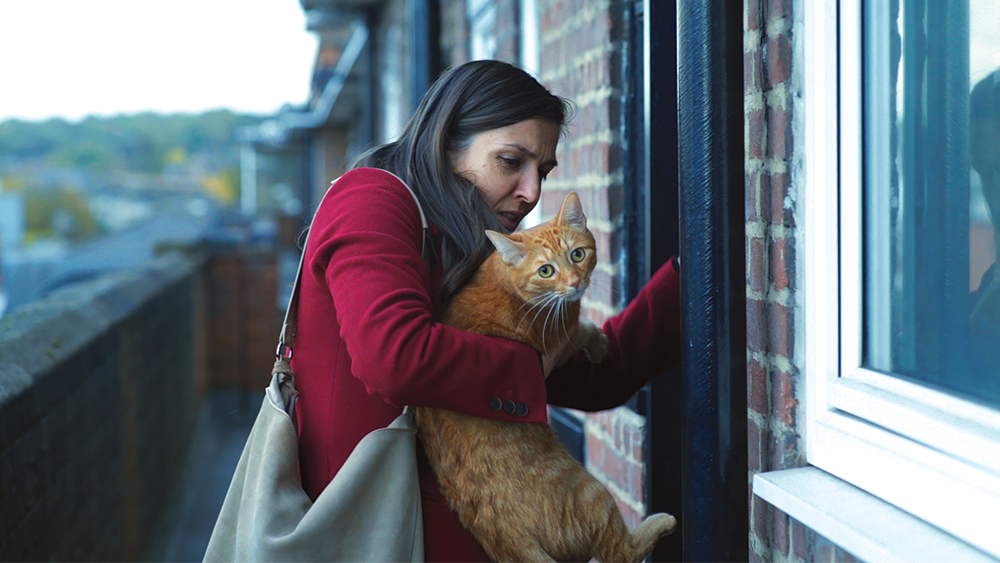‘Cat in the Wall’: SXSW Film Review
By Guy Lodge
LOS ANGELES (Variety.com) – [Editor’s note: “Cat in the Wall” is one of more than 100 movies originally scheduled to screen at the SXSW Film Festival in March. After the coronavirus outbreak forced the festival to cancel, event organizers partnered with Amazon Prime to make seven of those features available to stream for free through Weds., May 6.]
In present-day London, a Bulgarian single mother feuds with her working-class British neighbors over the rightful ownership of an independent-minded family pet, all the while raging that the apartment she bought is being needlessly renovated against her wishes, and at great personal expense to her. The metaphors for sociopolitical tension in Brexit Britain may be mixed in “Cat in the Wall,” but that doesn’t make them any less plain.
Mina Mileva and Vesela Kazakova’s smart, bristly film makes some room for oblique everyday poetry in its depiction of immigrants asserting their ground in an unstable country, but is angry enough not to bury its rhetoric in artifice and niceties: Shot through with intimate love-hate knowledge of its South London turf, this is a funny, frustrated yell from a demographic tired of being talked over.
Having premiered last year in Locarno’s main competition and subsequently done the festival rounds, Mileva and Kazakova’s film was set to make its North American bow at South By Southwest last month: Instead, it’s among the titles streaming to the public as part of SXSW’s Amazon Prime showcase. It has yet to be made available for viewing, however, in the U.K., where its blend of sardonic satire and Loachian social realism will cut closest to the bone.
It’s certainly hard to imagine any but the most elitely removed residents of contemporary London not relating to some aspect of the largely rain-sodden urban landscape the Bulgarian filmmakers — in their first non-documentary feature — have painted here, as their characters spar over everything from the threat of gentrification to the uglifying effect of PVC windows on British buildings.
Such issues are of professional and personal interest to Irina (Irina Atanasova), an intelligent, imaginative architect who hasn’t been able to work full-time as one since moving from Bulgaria to Britain, in pursuit of a better life for her sensitive young son Jojo (Orlin Asenov). That goal remains a work in progress, though she’s managed to buy the shabby ex-council apartment they inhabit in Peckham, a traditionally poor area recently invaded by middle-class hipsters and their accompanying upmarket bars — one of which provides Irina with a soul-sanding night job. Her brother Vladimir (Angel Genov), a historian who can only find work installing satellite dishes, lives with them; it’s a loving but largely exhausted household that gets a brief surge of joy when Irina takes in an apparent stray cat, to Jojo’s delight in particular.
A mixture of pride and self-preservation keeps Irina from fraternizing with her neighbors, many of them council tenants whom she views, not always fairly, as welfare scroungers — though it becomes clear she encounters enough xenophobic hostility in her day-to-day existence to make her haughtiness an understandable shield. Yet she’s forced to engage when a dysfunctional family in the same block claim to be the cat’s original owners; meanwhile, she meets with fellow leaseholders in the building when they’re hit with an exorbitant bill for communal repairs.
In the still-heated aftermath of Britain’s Brexit vote, it doesn’t take long for outwardly mundane conflicts to take an uglier turn. “Go back where you came from” is a heard all too frequently as an argumentative strike, while in the film’s most chillingly plausible setpiece, a policeman cautions a panicked Irina not to reply in her mother tongue: “Keep it in English or I’ll do you for obstruction.” Mileva and Kazakova’s loosely shaped, finely observed screenplay makes a neat social microcosm of the enemies and allies found in Irina’s building. The 52-48 breakdown of that wretched 2016 referendum feels more or less reflected here, perhaps a little too patly at one point where a residents’ meeting gives way to an overt debate on the matter. “Cat in the Wall” feels so alive to the presence of politics in everyday British discourse that the scene feels pedantic and over-written.
The film is best when the directors’ past experience as documentarians comes more organically to the fore, particularly in the gently naturalistic passages that depict Irina, Vladimir and Jojo’s intimate but inharmonious domestic routine — performed with flinty authenticity by all three principals, and abetted by Dimitar Kostov’s supple, fuzzy camerawork, which infuses exterior and interior shots alike with the specific taupe gloom of a London winter. Donka Ivanova’s jagged editing, meanwhile, frequently leaves scenes anxiously broken-off: After 90 minutes of everything and nothing happening, “Cat in the Wall” ends in urgent limbo, leaving its audience in much the state of uncertainty that Irina feels every day. There are no happy endings in Brexit Britain, the film seems to say; we’re still awaiting any ending at all.

